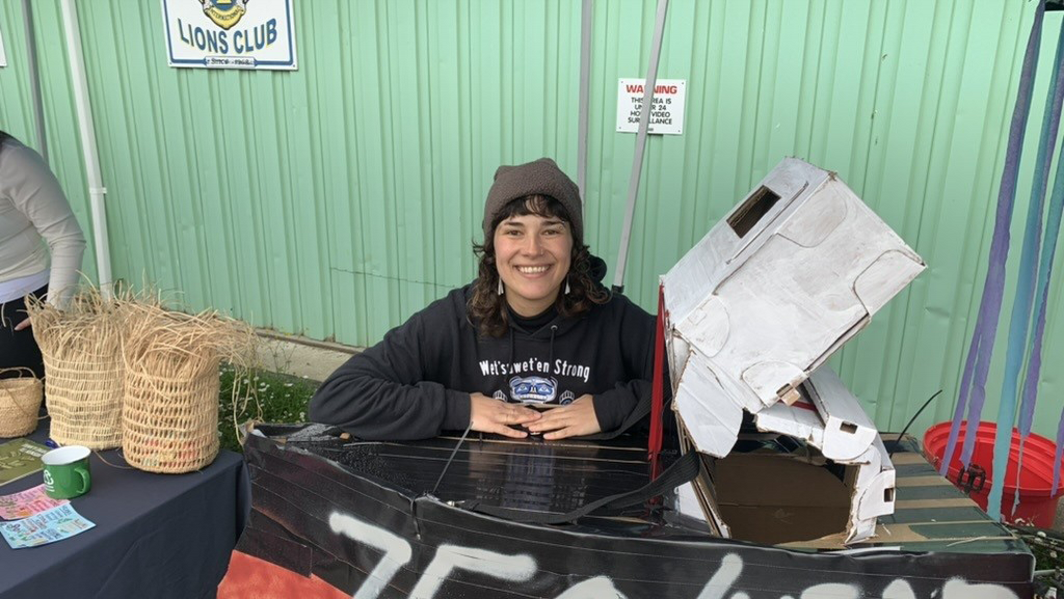Fostering food independence on Haida Gwaii
July 29, 2024

(UVic Sustainability Scholar, Julia Weder sits at an engagement booth at Hospital Day, an annual celebratory event in June in Daajing Giids to support community wellness and health) credit: supplied image
Long-term food security is a concern across many Indigenous communities, including Haida Gwaii, where the community is reclaiming traditional food knowledge and building food independence.
Julia Weder grew up on Haida Gwaii as a settler and recently returned for an internship as part of the UVic Sustainability Scholars Program. In 2021 she was adopted into a Skidegate Eagle Clan, Naa ‘Yuuwans Xaaydaga, and was given the name Skaak’aadang Jaad by Jiixa (Gladys Vandal).
Launched last year, the Sustainability Scholars Program is a paid internship program that pairs UVic graduate students with local community, industry, government, Indigenous and non-profit organizations to work on applied sustainability research projects. This year there are twelve sustainability scholars from six different UVic faculties working on projects with a variety of organizations in the region, including UVic Purchasing, West Coast Environmental Law, Cowichan Watershed Board, UVic Office of Campus Planning & Sustainability, among others.
Weder is working with Local Foods 2 School and the Haida Foods Committee to research and create an “All Islands Food Strategy” and a community food map.

(Julia and a friend hold local sea asparagus by the Tll.aal river, Haida Gwaii)
Food connects youth to traditional foods
The Local Foods 2 School program connects youth and families with traditional foods where they learn how to grow, gather, prepare, clean, cook, and store seasonally available ingredients.
In an interview conducted for the Haida Gwaii Food Strategy, one teacher explained how, “kids had planted, grown, and stored pumpkins, onion, and kale over a year, and now made them into a soup for their visitors from another school.”
“Teachers have seen youth’s confidence and mood improve as a result of being regularly connected to the school gardens,” says Weder.
The collaboration around food in the classroom extends into the community as well through the Haida Gwaii Food Strategy. With the high cost of groceries, gas, and growing materials, the community needed an engagement process to understand how to break down these barriers, explains Weder.
“We are also assessing local food-related social services, youth engagement strategies, climate crisis adaptations, freshwater security, and educational gaps/possibilities across Haida Gwaii,” says Weder. “Haida traditions of food cultivation, gathering, and harvesting are woven throughout these focus areas, and our community’s unique blend of values and knowledge are helping to inform a vibrant vision of building food independence on Haida Gwaii.”
Community food map
Weder is developing a community food map to support food independence on Haida Gwaii.
"The community food map will show locations of various food-related services, resource hubs, greenhouses, public gardens, and gathering sites across Haida Gwaii, to help people access local food information and infrastructure more easily," says Weder. "Each data point on the map (made digitally with Google My Maps) will provide details on the service or object and a link for further information."
Weder says once the digital map is complete, she will create a large illustrated poster version of the map that can be printed and shared with community members offline.
Weder hopes that as an ongoing project, data points will be added to the map through a community engagement process. This will help bolster the community’s sense of responsibility and collective care about shared local food resources and services.
“As a Sustainability Scholar, I am grateful for the opportunity to work with my community,” says Weder. “The internship allowed me to deeply integrate land-based, anti-colonial values into my life while developing my professional skills in the field of sustainability.”
To learn more about the UVic Sustainability Scholars Program as a graduate student or as an organization with a pressing sustainability challenge and ideas for an applied research project, contact the program manager or visit their website.
-end-
